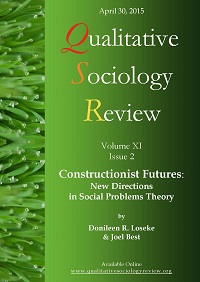Social Constructionism Turned Into Human Service Work
DOI:
https://doi.org/10.18778/1733-8077.11.2.13Keywords:
Applied Constructionism, Constructionist Activism, Statements/Counterstatements, Narrative Therapy, Oppressive vs. Liberating Stories, Expert KnowledgeAbstract
Studies of applied constructionism are opportunities for scholars to explore how social constructionism is a resource used by claims-makers in describing and justifying their orientations to professional practice. The present paper expands sociological constructionism by analyzing applied constructionism in social problems work in Copenhagen, Denmark. Based on interviews with staff members in narrative drug treatment, we explore two themes: the relationship between dominant and liberating narratives and the position of expert knowledge in narrative therapy. Our guiding framework is Ian Hacking’s inquiry into the Social Construction of What? and Kenneth Burke’s dialogic approach of comparing statements to counterstatements. The purpose of the paper is to link academic studies of the social construction of realities to applied constructionists’ principles in addressing social problems. We do this by describing narrative therapists’ critical reflections on their own work, suggesting that these reflections are not only useful when it comes to developing narrative therapy but also for the advancement of academic constructionism.
Downloads
References
Afuape, Taiwo. 2011. Power, Resistance, and Liberation in Therapy With Survivors of Trauma: To Have Our Hearts Broken. New York: Routledge.
Google Scholar
DOI: https://doi.org/10.4324/9780203806401
Besley, Tina. 2001. “Foucauldian Influences in Narrative Therapy: An Approach for Schools.” Journal of Educational Enquiry 2:72-93.
Google Scholar
Bruner, Jerome. 1986. Actual Minds, Possible Worlds. Cambridge, MA: Harvard University Press.
Google Scholar
DOI: https://doi.org/10.4159/9780674029019
Burke, Kenneth. 1966. Language as Symbolic Action. Berkeley: University of California Press.
Google Scholar
DOI: https://doi.org/10.1525/9780520340664
Burke, Kenneth. 1968. Counter-Statement. Berkeley: University of California Press.
Google Scholar
Burke, Kenneth. 1969a. A Grammar of Motives. Berkeley: University of California Press.
Google Scholar
DOI: https://doi.org/10.1525/9780520341715
Burke, Kenneth. 1969b. A Rhetoric of Motives. Berkeley: University of California Press.
Google Scholar
Flaskas, Carmen. 2002. Family Therapy Beyond Postmodernism: Practice Challenges Theory. New York: Taylor & Francis.
Google Scholar
DOI: https://doi.org/10.4324/9780203360699
Foucault, Michel. 1972. Power/Knowledge: Selected Interviews and Other Writings 1972-1977, edited by C. Gordon. New York: Pantheon Books.
Google Scholar
Foucault, Michel. 1977. Discipline and Punish: The Birth of the Prison. New York: Random House.
Google Scholar
Freedman, Jill and Gene Combs. 1996. Narrative Therapy: The Social Construction of Preferred Realities. New York: W.W. Norton & Company.
Google Scholar
Hacking, Ian. 1999. The Social Construction of What? Cambridge: Harvard University Press.
Google Scholar
Hall, Christopher. 1997. Social Work as Narrative: Storytelling and Persuasion in Professional Texts. Aldershot: Ashgate Publishing.
Google Scholar
Järvinen, Margaretha and Gale Miller. 2014. “Selections of Reality: Applying Burke’s Dramatism to a Harm Reduction Program.” International Journal of Drug Policy 25(5):879-887.
Google Scholar
DOI: https://doi.org/10.1016/j.drugpo.2014.02.014
Lock, Andy and Tom Strong, (eds.). 2012. Discursive Perspectives in the Therapeutic Practice. Oxford: Oxford University Press.
Google Scholar
DOI: https://doi.org/10.1093/med/9780199592753.001.0001
Mattingly, Cheryl and Maureen Hayes Fleming. 1994. Clinical Reasoning: Forms of Inquiry in a Therapeutic Practice. Philadelphia: F.A. Davis Company.
Google Scholar
Miller, Gale and Katherine Fox. 1999. “Learning From Sociological Practice: The Case of Applied Constructionism.” The American Sociologist 30:55-74.
Google Scholar
DOI: https://doi.org/10.1007/s12108-999-1004-8
O’Leary, Patrick. 1998. “Liberation From Self-Blame: Work With Men Who Have Experienced Childhood Sexual Abuse.” Dulwich Centre Journal 4:24-40.
Google Scholar
Parry, Alan and Robert E. Doan. 1994. Story Re-Visions: Narrative Therapy in the Postmodern World. New York: The Guilford Press.
Google Scholar
Parton, Nigel and Patrick O’Byrne. 2000. Constructive Social Work: Towards a New Practice. London: Macmillan Press.
Google Scholar
Rosen, Lynne V. and Charley Lang. 2005. “Narrative Therapy With Couples: Promoting Liberation From Constraining Influences.” Pp. 157-178 in Handbook of Couples Therapy, edited by M. Harway. Hoboken, NJ: Wiley & Sons.
Google Scholar
Shanahan, Elizabeth, Michael D. Jones, and Mark K. McBeth. 2011. “Policy Narratives and Policy Processes.” The Policy Studies Journal 39:535-561.
Google Scholar
DOI: https://doi.org/10.1111/j.1541-0072.2011.00420.x
Skovlund, Henrik. 2011. “Overcoming Problems of Relativism in Postmodern Psychotherapy.” Journal of Contemporary Psychotherapy 41(3):187-198.
Google Scholar
DOI: https://doi.org/10.1007/s10879-010-9166-9
Stacey, Ralph, Douglas Griffin, and Patricia Shaw. 2000. Complexity and Management: Fad or Radical Challenge to Systems Thinking? London: Routledge.
Google Scholar
Strong, Tom. 2012. “Conversation and Its Therapeutic Possibilities.” Pp. 308-322 in Discursive Perspectives in Therapeutic Practice, edited by A. Lock and T. Strong. Oxford: Oxford University Press.
Google Scholar
DOI: https://doi.org/10.1093/med/9780199592753.003.0017
Strong, Tom and Andy Lock. 2005. “Discursive Therapy?” Janus Head 8:585-593.
Google Scholar
Throgmorton, James A. 1996. Planning as Persuasive Storytelling: The Rhetorical Construction of Chicago’s Electric Future. Chicago: University of Chicago Press.
Google Scholar
Wallis, Jennifer, Jan Burns, and Rose Capdevila. 2011. “What Is Narrative Therapy and What Is It Not? The Usefulness of Q Methodology to Explore Accounts of White and Epston’s (1990) Approach to Narrative Therapy.” Clinical Psychology and Psychotherapy 18:486-497.
Google Scholar
DOI: https://doi.org/10.1002/cpp.723
White, Michael. 1995. Re-Authoring Lives: Interviews and Essays. Adelaide: Dulwich Centre Publications.
Google Scholar
White, Michael and David Epston. 1990. Narrative Means to Therapeutic Ends. New York: W.W. Norton & Company.
Google Scholar
Wittgenstein, Ludwig. 1958. Philosophical Investigations. New York: Macmillan Publishing.
Google Scholar
Wittgenstein, Ludwig. 1980a. Remarks on the Philosophy of Psychology, edited by G. E. M. Anscombe and G. H. von Wright. Oxford: Blackwell.
Google Scholar
Wittgenstein, Ludwig. 1980b. Remarks on the Philosophy of Psychology, edited by G. H. von Wright and C. G. Luckhart. Oxford: Blackwell.
Google Scholar
Downloads
Published
How to Cite
Issue
Section
License

This work is licensed under a Creative Commons Attribution-NonCommercial-NoDerivatives 4.0 International License.











